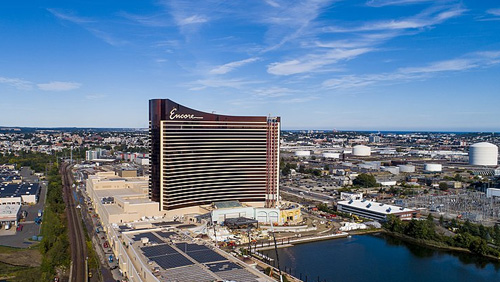The process that ultimately saw Wynn Resorts receive a license to build a casino resort in Boston, Massachusetts was a fraud. This is the claim of a competing company, Sterling Suffolk Racecourse, which is seeking $3 billion in compensation from the Las Vegas-based casino giant.
 Sterling filed its lawsuit last September, asserting the licensing processing was rife with fraud, cronyism and marred by “a number of improprieties. The lawsuit was recently amended to include complaints that the former chairman of the Massachusetts Gaming Commission (MGC), Stephen Crosby, had been compromised due to a “decades-long” friendship that he had with one of the owners of the property that had been purchased by Wynn Resorts for the new complex.
Sterling filed its lawsuit last September, asserting the licensing processing was rife with fraud, cronyism and marred by “a number of improprieties. The lawsuit was recently amended to include complaints that the former chairman of the Massachusetts Gaming Commission (MGC), Stephen Crosby, had been compromised due to a “decades-long” friendship that he had with one of the owners of the property that had been purchased by Wynn Resorts for the new complex.
Wynn purchased the 36-acre tract of land from FBT Everett Realty, which was born as a joint venture that includes Paul Lohnes as its majority owner. Lohnes is reportedly a long-time friend of Crosby, who was in charge of the MGC at the time the purchase was made.
Sterling asserts in its lawsuit that Lohnes and Crosby had repeated contact in 2012, coincidentally at the same time Wynn was searching for property for its resort. The lawsuit specifically points out that the two met in May 2012 and that Crosby showed “an interest in brining casino operators to Everett, even though the Everett Site had not yet been marketing before that time, even by its owners, for use as a casino.”
When Wynn purchased the property in 2012, at a price tag of $75 million, it was discovered that Charlie Lightbody, who reportedly had ties to organized crime, was a partner in FBT.
Sterling also asserts in its lawsuit that the mayor of Everett, Carlo DeMaria, was involved in the sale of the property to Wynn and that he employed a “convicted criminal” as a consultant for FBT in order to receive an “expected cut of the proceeds” from the transaction. He is also accused of having received kickbacks in relation to the deal. Sterling’s suit states that “by fraud, kickbacks, political cronyism crossing the line of legality and other unlawful methods, the Defendants conspired to fix the application process.”
Wynn’s Boston project has been a continuous headache for the company and the resort’s path is anything but clear. The company is still involved in litigation on several fronts due to the sexual misconduct allegations levied against its founder and former CEO Steve Wynn, and has been investigated by the Nevada Gaming Control Board, as well as the MGC. The MGC has completed its investigation, but is waiting to see how things play out in Nevada before issuing its ruling.